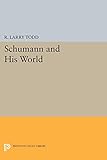Schumann and His World / ed. by R. Larry Todd.
Material type: TextSeries: The Bard Music Festival ; 34Publisher: Princeton, NJ : Princeton University Press, [2014]Copyright date: ©1994Edition: Course BookDescription: 1 online resource (408 p.)Content type:
TextSeries: The Bard Music Festival ; 34Publisher: Princeton, NJ : Princeton University Press, [2014]Copyright date: ©1994Edition: Course BookDescription: 1 online resource (408 p.)Content type: - 9780691607023
- 9781400863860
- 780/.92 23
- online - DeGruyter
- Issued also in print.
| Item type | Current library | Call number | URL | Status | Notes | Barcode | |
|---|---|---|---|---|---|---|---|
 eBook
eBook
|
Biblioteca "Angelicum" Pont. Univ. S.Tommaso d'Aquino Nuvola online | online - DeGruyter (Browse shelf(Opens below)) | Online access | Not for loan (Accesso limitato) | Accesso per gli utenti autorizzati / Access for authorized users | (dgr)9781400863860 |
Frontmatter -- Contents -- Preface -- Acknowledgments -- PART I. ESSAYS -- History, Rhetoric, and the Self: Robert Schumann and Music Making in German-Speaking Europe, 1800-1860 -- Schumann's Homelessness -- On Quotation in Schumann's Music -- Schumann's Symphonic Finales -- Schumann's "New Genre for the Concert Hall": Das Paradies und die Peri in the Eyes of a Contemporary -- The Intentional Tourist: Romantic Irony in the Eichendorff Liederkreis of Robert Schumann -- "Actually, Taken Directly from Family Life": Robert Schumann's Album fur die Jugend -- PART II. LETTERS AND MEMOIRS -- The Correspondence between Clara Wieck Schumann and Felix and Paul Mendelssohn -- Reminiscences of Robert Schumann (1878) -- Robert Schumann in Endenich (1899) -- Schumanniana (1925) -- PART III. Criticism -- On Robert Schumann's Piano Compositions (1844) -- Robert Schumann with Reference to Mendelssohn-Bartholdy and the Development of Modern Music in General (1845) -- Robert Schumann (1855) -- Schumanniana No. 4· The Present Musical Epoch and Robert Schumann's Position in Music History (1861) -- On Schumann as Symphonist (1904-1906) -- Index of Names and Compositions -- List of Contributors
restricted access online access with authorization star
http://purl.org/coar/access_right/c_16ec
We know Robert Schumann in many ways: as a visionary composer, a seasoned journalist, a cultured man of letters, and a genius who, having passed his mantle on to the young Brahms, succumbed to mental illness in 1856. Drawing on recent pathbreaking research, this collection offers new perspectives on this seminal nineteenth-century figure.In Part I, Leon Botstein and Michael P. Steinberg assess Schumann's efforts to place music at the center of German culture, in public and private sectors. Bernhard R. Appel offers a probing source study of one of Schumann's most personal works, the Album für die Jugend, Op. 68, while John Daverio considers the generic identity of Das Paradies und die Peri, and Jon W. Finson reexamines the first version of the Eichendorff Liederkreis. Gerd Nauhaus investigates Schumann's approach to the symphonic finale, and R. Larry Todd considers the intractable issue of "ations and allusions in Schumann's music. Part II presents letters and memoirs, including unpublished correspondence between Clara Schumann and Felix and Paul Mendelssohn-Bartholdy. In Part III, conflicting critical views of Schumann are juxtaposed. Some of these sources are translated into English for the first time.Originally published in 1994.The Princeton Legacy Library uses the latest print-on-demand technology to again make available previously out-of-print books from the distinguished backlist of Princeton University Press. These editions preserve the original texts of these important books while presenting them in durable paperback and hardcover editions. The goal of the Princeton Legacy Library is to vastly increase access to the rich scholarly heritage found in the thousands of books published by Princeton University Press since its founding in 1905.
Issued also in print.
Mode of access: Internet via World Wide Web.
In English.
Description based on online resource; title from PDF title page (publisher's Web site, viewed 30. Aug 2021)


